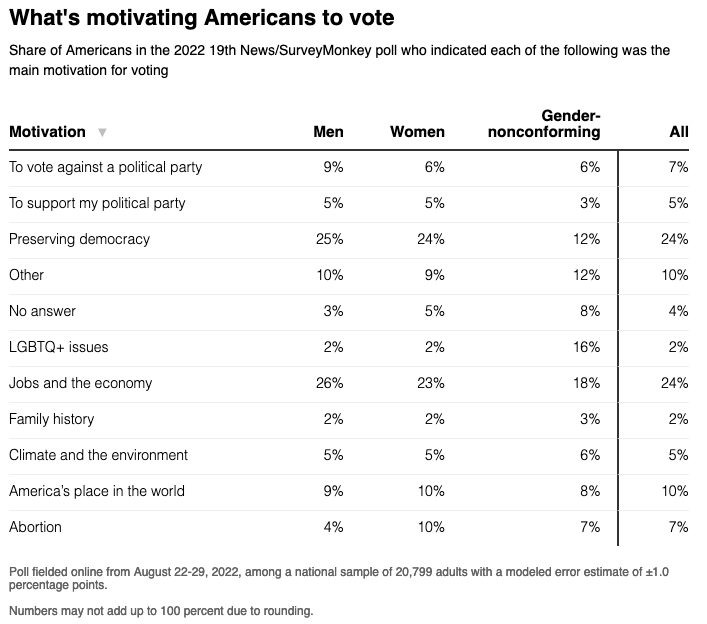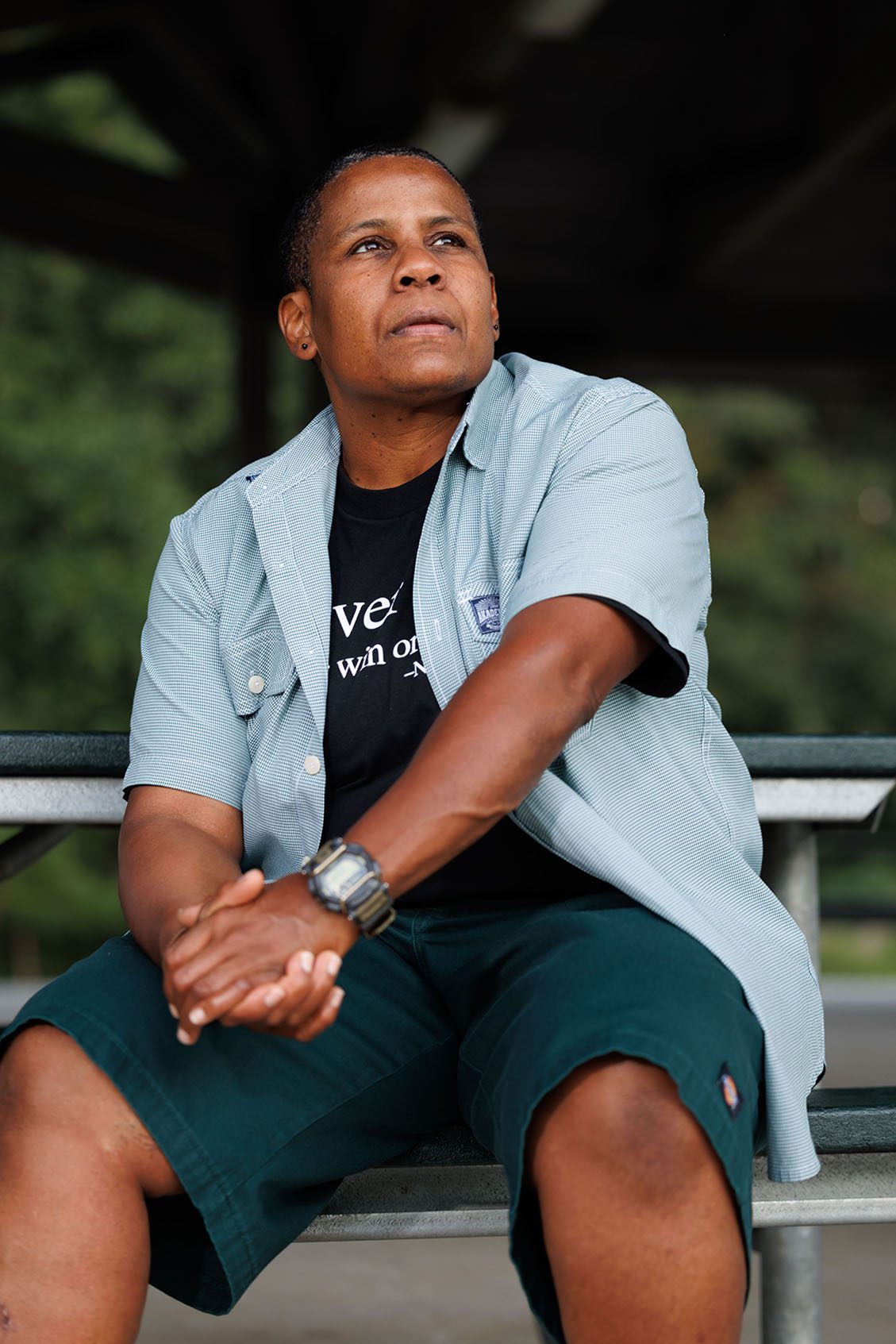As Americans prepare to head to the polls in less than two months, the issue of democracy is top of mind for many, according to a new 19th News/SurveyMonkey poll.
“Preserving democracy” tied with “jobs and the economy” as the top issue for Americans in the midterm elections, with nearly a quarter of adults choosing the issue as most important. It was the clear choice among Democrats at 34 percent.
The party split plays out across genders as well, with Republican-leaning men (31 percent) and women (29 percent) more likely to say jobs and the economy is their top motivator for voting. Preserving democracy was more likely to be a motivator for Democratic men (37 percent) and women (33 percent). Among independents, jobs and the economy is the top issue for men (32 percent), women (30 percent) and gender-nonconforming people (22 percent). For gender-nonconforming Democrats, LGBTQ+ issues are the top motivator to vote; not enough gender-nonconforming Republicans were surveyed for analysis.
In campaign ads and on the stump, Republicans have blamed Democrats for inflation and the high cost of living from the gas pump to the grocery store. Democrats have cast Republicans as too extreme on abortion and as a threat to democracy, pointing to candidates who have embraced false claims that the 2020 election results were not vaild.
Election deniers are on the ballot for roughly 60 percent of Americans this fall, according to a FiveThirtyEight analysis. Polling shows that 70 percent of Republicans continue to believe former President Donald Trump did not lose in 2020 — a lie he still tells regularly as he holds rallies amid an ongoing inquiry into his involvement in the January 6, 2021, insurrection.
Andrea Benjamin, an associate professor at the University of Oklahoma, said voters may be reassessing the health of government following not just the 2020 election but the Supreme Court ruling that overturned federal abortion rights. Some potential voters may be realizing that governing bodies such as state legislatures have immense power to impact their lives.
“It’s sort of a perfect storm,” Benjamin told The 19th. “… I think this idea of saving democracy maybe really comes back to some of those questions.”
The 19th News/SurveyMonkey poll shows that 2 in 5 Americans believe that democracy is working “very” or “somewhat” well for them. Martha Sheard of Snellville, Georgia, 51, said it is working somewhat well for her. The Detroit native, who moved to the Atlanta suburb 15 years ago and owns a home repair business said, “there are so many forces” working against Democrats. Sheard is also a Democrat and wants President Joe Biden to get more of his agenda through Congress.
“Things could be better if everything wasn’t a fight,” she said.
Sheard and her wife have voted absentee in recent cycles, and she’s making a plan for how she will vote in November. Her previous ballot dropbox was moved, and she said there’s confusion in the state after new voting laws were passed in 2021.
Still, she said, the stakes are too high to not vote. Sheard recently talked to three of her employees, all Black men, about making sure they’re registered and planning to turn out, too.
“I told them, ‘We can’t sit out,’” Sheard said. “If we don’t have a democracy, only White men get to tell everybody what to do. We don’t have all the money, but we can still fight. They want to make it so hard, but we know how easy it can be and they’re making it harder to vote.”
Preserving democracy, which Sheard named as her top motivation, may have different meaning for voters, said Khalilah L. Brown-Dean, a political science professor at Quinnipiac University in Connecticut. It covers political flashpoints such as reproductive choice, the protection of voting rights, and even the future of school curricula and books. She said it also allows for “a broader and more inclusive strategy that encompasses a range of identities and lived experiences.”
“One of the great ironies of American democracy is that women have often been called on to protect it, while being denied access to its most basic protections,” Brown-Dean told The 19th in an email. “And now in 2022 we see one of the most diverse cadres of women running for political office that cuts across markers of race, ethnicity, gender identity, and class. Organizing around the preservation of democracy more broadly has the potential to connect that candidate diversity to the mobilization of women voters as a cohesive bloc.”
The 19th News/SurveyMonkey poll does not find either party with the edge going into November. More than 7 in 10 Republicans and Democrats say they’re enthusiastic about voting in this year’s election. Thirty-eight percent of Americans say they would vote for the Republican candidate; 39 percent say they’d vote for the Democrat.
The poll was conducted online in English and Spanish from August 22 to 29 among a national sample of 20,799 adults.
Black Americans are among the strongest supporters of the Democratic Party, and just shy of two-thirds of both Black women and Black men say they support President Joe Biden and Vice President Kamala Harris.
Betty Moyers, 69, said that for her, democracy is not working so well. She thought Americans had settled a lot of things during her lifetime, particularly around progress around issues of race and gender.
But the self-described “die-hard Democrat,” who grew up on a farm in Tennessee, was raised by parents who “were Republican back when Republicans had policies,” she said. She says she’s disappointed by what she sees happening in her country now and fears for the future of democracy.
“In my lifetime, I have never felt this way,” Moyers said. “I have faith in the American people. We have got to figure out what is important,”
Moyers said she was “devastated” watching the congressional hearings on the January 6 attack on the Capitol as the 2020 election was being certified. She is very motivated to vote this year in particular on the issue of abortion in the wake of the Supreme Court ruling.
“I fought that battle, and I do not intend to fight it again,” she said.
Republished with permission from The 19th, by Errin Haines, Barbara Rodriguez, Jasmine Mithani

The 19th News
A century ago, the 19th Amendment to the U.S. Constitution made voting, our country’s most fundamental mode of civic participation, a right regardless of gender. But this watershed moment in our democracy excluded millions of women, particularly women of color, from the ballot box for generations. And the reality is suffrage remains a work in progress for many in this country, particularly people living in states where voter suppression exists and tens of thousands of transgender Americans who face barriers to voting.


